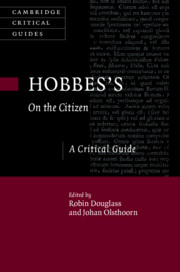Book contents
- Hobbes’s On the Citizen
- Cambridge Critical Guides
- Hobbes’s On the Citizen
- Copyright page
- Contents
- Contributors
- Acknowledgments
- Abbreviations
- Introduction
- Chapter 1 Excavating On the Citizen
- Chapter 2 Hobbes and Aristotle on the Foundation of Political Science
- Chapter 3 All the Mind’s Pleasure: Glory, Self-Admiration, and Moral Motivation in On the Citizen and Leviathan
- Chapter 4 The Right of Nature and Political Disobedience: Hobbes’s Puzzling Thought Experiment
- Chapter 5 Motivation, Reason, and the Good in On the Citizen
- Chapter 6 Property and Despotic Sovereignty
- Chapter 7 Sovereignty and Dominium: The Foundations of Hobbesian Statehood
- Chapter 8 Corporate Persons without Authorization
- Chapter 9 Hobbes on Love and Fear of God
- Chapter 10 “A Rhapsody of Heresies”: The Scriptural Politics of On the Citizen
- Chapter 11 On the Citizen and Church-State Relations
- Chapter 12 Sovereign-Making and Biblical Covenants in On the Citizen
- Bibliography
- Index
- Cambridge Critical Guides
Chapter 4 - The Right of Nature and Political Disobedience: Hobbes’s Puzzling Thought Experiment
Published online by Cambridge University Press: 15 November 2019
- Hobbes’s On the Citizen
- Cambridge Critical Guides
- Hobbes’s On the Citizen
- Copyright page
- Contents
- Contributors
- Acknowledgments
- Abbreviations
- Introduction
- Chapter 1 Excavating On the Citizen
- Chapter 2 Hobbes and Aristotle on the Foundation of Political Science
- Chapter 3 All the Mind’s Pleasure: Glory, Self-Admiration, and Moral Motivation in On the Citizen and Leviathan
- Chapter 4 The Right of Nature and Political Disobedience: Hobbes’s Puzzling Thought Experiment
- Chapter 5 Motivation, Reason, and the Good in On the Citizen
- Chapter 6 Property and Despotic Sovereignty
- Chapter 7 Sovereignty and Dominium: The Foundations of Hobbesian Statehood
- Chapter 8 Corporate Persons without Authorization
- Chapter 9 Hobbes on Love and Fear of God
- Chapter 10 “A Rhapsody of Heresies”: The Scriptural Politics of On the Citizen
- Chapter 11 On the Citizen and Church-State Relations
- Chapter 12 Sovereign-Making and Biblical Covenants in On the Citizen
- Bibliography
- Index
- Cambridge Critical Guides
Summary
There are three distinct moments in the trajectory of natural right in On the Citizen. The first occurs when Hobbes makes the argument for the right of nature and then claims that it amounts to the “right to all things” in the state of nature. The second moment happens when Hobbes offers an account of how this expansive right is given up and an argument for why a person cannot be obligated by an agreement not to resist death. The third moment comes in where Hobbes takes up the question of the scope and limits of political obligation. In this last instance he extends the account of when people can disobey the sovereign to include disobedience to dishonorable commands, in particular a command to kill a parent, which a person need not obey. Over the course of On the Citizen, then, natural right expands, contracts, and expands again. This chapter demonstrates that this fluctuation in Hobbes’s articulation of natural right sets the stage for a particularly curious thought experiment that he offers in the guise of a parricide example. I argue that this thought experiment underscores a tension that remains unresolved in On the Citizen.
- Type
- Chapter
- Information
- Hobbes's On the CitizenA Critical Guide, pp. 71 - 88Publisher: Cambridge University PressPrint publication year: 2019

